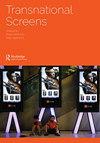Review of the transnational cinemas special interest group panels at the society for cinema and media studies conference, Seattle, Washington, USA, March 13–17, 2019
IF 0.4
0 FILM, RADIO, TELEVISION
引用次数: 0
Abstract
Disciplines and arenas of scholarly endeavour are rarely fixed categories. While they do not change overnight, over a period of time one can track how they expand their boundaries. Nomenclatures and categories are often the semiotic vanguard of such changes. Perhaps in the case of cinema studies, especially as it relates to the Society of Cinema and Media Studies, one can easily identify two such moments – the year 2002, when the organization changed its official name from Society of Cinema Studies, and 2018, when the name of its peer-reviewed journal was changed from Cinema Journal to The Journal of Cinema and Media Studies. Such changes in name are a sign of disciplinary evolution, and an attempt to account for the efflorescence of new objects, trends and directions that emerge with tectonic shifts in the dimensions of the discipline. The ripple effects of such changes were clearly visible in the proceedings of the Transnational Cinemas Special Interest Group (SIG) at the 2019 Society of Cinema and Media Studies Conference held in Seattle. Founded in 2012, the Transnational Cinemas SIG has been discussing a potential change in its name since last year to reflect the larges shifts in the discipline, and also better represent the work of its members who work on areas of screen culture and media studies beyond just cinema. From its very inception, the Transnational Cinema SIG annual meeting has been a space of discussion about such issues. Questions such as what the ‘transnational’ is, what are its methodological implications and what is its relevance to the study of cinema have been integral part of these annual meetings, leading in one case, to a roundtable on this topic that was published in the Frames Cinema Journal in 2016. It is perhaps this scholarly investment that has made the question of nomenclature so important to the SIG. At this year’s Transnational Cinemas SIG annual board meeting held on 13 March 2019, this question re-emerged as a key point of discussion among its attendees. Keeping with the theme of nomenclature, one of the key announcements made at the meeting on behalf of Deborah Shaw, was the change in the name of Transnational Cinemas journal (2010–2018) to its current form, Transnational Screens. The annual meeting was also where two key announcements were made. First and foremost, elections for two posts in the board membership were made – one for the post of Graduate Student Representative, and the other for the post of Co-President, to replace Elena Caoduro stepped down after a two-year stint with Raphael Raphael. The other key announcement was the declaration of the first Transnational Cinemas Graduate Student Writing Prize.2019年3月13日至17日,美国华盛顿西雅图,电影与媒体研究学会会议上跨国电影特别兴趣小组小组回顾
学术研究的学科和领域很少有固定的范畴。虽然它们不会在一夜之间改变,但在一段时间内,人们可以跟踪它们如何扩展其边界。命名法和分类通常是这种变化的符号学先锋。也许就电影研究而言,特别是与电影与媒体研究协会有关的电影研究,人们可以很容易地识别出两个这样的时刻——2002年,该组织将其正式名称从电影研究协会更改为2018年,其同行评审期刊的名称从电影杂志更改为电影与媒体研究杂志。这种名称上的变化是学科进化的标志,也是试图解释随着学科维度的结构性变化而出现的新对象、趋势和方向的蓬勃发展。在西雅图举行的2019年电影与媒体研究学会会议上,跨国电影院特别兴趣小组(SIG)的会议记录清楚地显示了这些变化的连锁反应。跨国电影协会成立于2012年,自去年以来一直在讨论更名的可能性,以反映该学科的巨大变化,并更好地代表其成员在电影以外的屏幕文化和媒体研究领域的工作。从一开始,跨国电影SIG年会就是一个讨论这些问题的空间。诸如“跨国”是什么,它的方法论含义是什么,它与电影研究的相关性是这些年度会议的组成部分,其中一个案例导致了2016年在《框架电影杂志》上发表的关于这一主题的圆桌会议。也许正是这种学术投资使得命名问题对SIG如此重要。在2019年3月13日举行的今年跨国影院SIG年度董事会会议上,这个问题再次成为与会者讨论的重点。与命名主题保持一致,代表黛博拉·肖(Deborah Shaw)在会议上发表的重要声明之一是将《跨国影院》杂志(2010-2018)的名称改为目前的形式,即《跨国银幕》。年会还发布了两项重要声明。首先,进行了两个董事会成员的选举,一个是研究生代表,另一个是联合主席,以取代埃琳娜·考杜罗(Elena Caoduro),她在拉斐尔·拉斐尔(Raphael Raphael)任职两年后辞职。另一个重要的公告是宣布了第一届跨国电影研究生写作奖。
本文章由计算机程序翻译,如有差异,请以英文原文为准。
求助全文
约1分钟内获得全文
求助全文
来源期刊

Transnational Screens
Arts and Humanities-Visual Arts and Performing Arts
CiteScore
0.60
自引率
0.00%
发文量
23
 求助内容:
求助内容: 应助结果提醒方式:
应助结果提醒方式:


